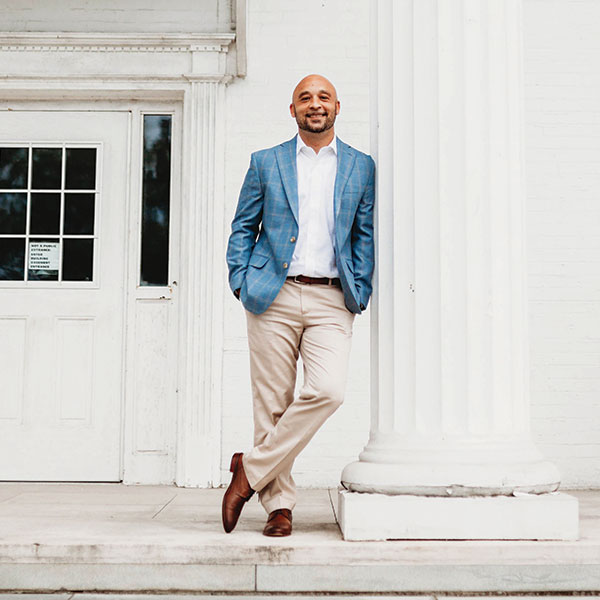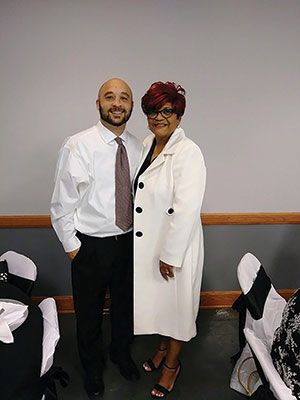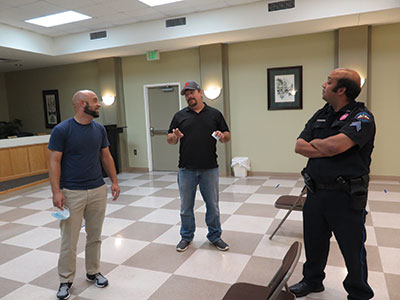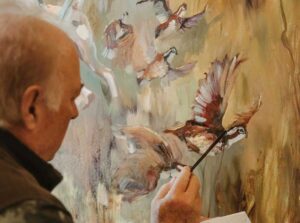
Becoming Ashville’s
mayor was a lifelong destiny
Story by Elaine Hobson Miller
Photo by Meghan Frondorf
Derrick Mostella was destined to be mayor of Ashville. The first time he walked into the old B&R Grocery on Sixth Street as a kid, proprietor Bill Murray looked down at him and declared, “You’re gonna be mayor one day, kid.”
“My mom told that story so much with me growing up, at some point, I just decided it was already written, that it was something I had to do,” Mostella says. “She told the story like I didn’t have a choice.”
The path to the mayor’s office wasn’t a straight one, nor was it lined with roses and violins. Rather, it was a circuitous route fraught with identity issues because of his biracial background. But dealing with those issues shaped Mostella’s character and, ultimately, his vision for the City of Ashville. It’s a vision that is changing the face of the downtown area and the way city government operates. Mostella hopes it’s changing the way Ashvillians feel about their town, too.
“My mom and I do a Thanksgiving dinner every year that’s free to the public,” Mostella says. “We did it take-out style in 2020, but it really kind of embodies what we want for Ashville. We want it to be a kind of mix of Mayberry and Cheers, where everybody knows your name.”
When Mostella was elected mayor for his first term in 2016, he was 37, making him one of the city’s youngest mayors and its first biracial one at the same time. Local newspaper headlines portrayed him as the city’s first Black mayor, and that made Mostella cringe. He works hard at avoiding labels, believing they are meant to separate and divide. Besides, calling him “Black” doesn’t tell his whole story.
“I do understand the pride our Black citizens feel about my election, and I appreciate the fact that they feel they have a voice now where they may have not in the past,” Mostella says.
It’s no secret that Mostella has a Black mother and a white father. His mother, Belinda Mostella, was a dispatcher at the city jail when she met his father, James Murray, who was an Ashville police officer. Although he has never had an in-depth relationship with his father’s family, Mostella has always known where he came from and is proud of that.
“I’m a child of Ashville,” he says. “Everybody knows who my folks are. I would hope that race doesn’t do a whole lot to dictate how somebody feels about me. I got elected not by Black people, not by white people, but by the people of Ashville, and I like to thinkthey elected me because I share their values, and they trust me, and none of that has anything to do with race at the end of the day.”
Race played a big role in Mostella’s childhood, though. He was raised in a Black household by his mom and his great-grandparents, Walter and Lila Mostella, but his light skin and curly blonde hair led casual acquaintances to think he was white. That made for some testy situations, some of them funny, some of them heart-breaking, all of them shaping his view of the world.
“My first experience in elementary school, and I can remember it like it was yesterday, was having a white kid ask me, ‘Why you gittin’ on the bus with all those N****s?” Mostella recalls. “Same thing on the playground. I’m out there with my brother, my cousins, and some kid comes up and says, ‘What you doin’ over there with them, why ain’t you over here?’ A shy kid, often he just ran off and cried. “There were many, many times I would cry myself to sleep,” he says.
His great-grandparents tried to shield him from the slings and arrows of racial tensions as much as they could. “I can remember our church going to Six Flags and my great-grandmother wouldn’t let me go because she was convinced something bad would happen to me,” he says, choking back tears at the painful memory. “She said, ‘Being this little white kid over there with all those Black folks (from his church), everybody having fun, not paying attention, they’re not going to watch you, and something will happen, you just can’t go, baby.’ As much as that hurt, I knew she did it because she loved me, and she was really, really trying to protect me.”
He sees wry humor, however, in a repeating high school experience. His all-time favorite teacher was Gina Wilson, who now works for the St. Clair County Board of Education. Every time a standardized test came around, she would allow Mostella to stand up in class and flip a coin to decide his race for that day. “You know those standardized tests where they ask for your race,” Mostella says, smiling at the memory. “I would say heads Black, tails white. So that was a running joke, what color are you going to be today, dear?”
His nickname, Flip, had nothing to do with that coin toss, however. An uncle who was a fan of comedian Flip Wilson gifted him with that moniker and it stuck. “Everybody knows me as ‘Flip,’” he says.
Mostella says his early years were tough because he caught whacks from both ends of the racial stick. “I’ve probably seen more racism than the average 100 percent Black person. There was a period in my life where I wasn’t white enough for white folks and not Black enough for Black folks, and that was rough,” he says, the tears flowing freely now. “It was brutal. My great-grandmother was my rock. She was the one I would go and cry on.”
When Mostella was in middle school, his mom moved to Memphis. He persuaded her to let him stay in Ashville with his great-grandparents. She convinced him to join her when he was 15, and it was his first time to leave the state of Alabama. That move lasted six weeks. During the middle of those six weeks, he returned to Ashville for a football game and ran into Amanda Minton. After admitting they had crushes on each other, they hung out, and he decided then and there to move home.
Mostella was always near the top of his class at Ashville High School and wanted to go to college. His grandparents couldn’t read or write, so they couldn’t sign applications for college and financial aid. Amanda, who is now his wife, did all of that for him. “She forced me to do it, letting me know it needed to be done and holding me accountable to get it done,” he says, tearing up again. “She’s fantastic, she really is, and I probably don’t tell her that enough.”
Mostella and Minton, who is white, graduated from AHS in 1997. Both went to UAB for a year, then transferred to Gadsden State Community College to finish their prerequisites. Around 1999 or 2000, both moved to Memphis, where he worked and lived with his mom while Minton lived in the dorm and got her occupational therapist degree at UT-Memphis. They stayed in Memphis for a year or two after she graduated, then returned home to Ashville in 2004 and got married. “We knew that whatever we wanted to accomplish, we wanted it to be here,” he says.
He worked for his father-in-law, Terry Minton, at Teague’s Hardware for a couple of years while contemplating his next move. He enjoyed most of his time there, but it’s also where he had some of the same type of painful experiences he had growing up. He was often the guy standing in a corner that no one knows is part Black.
“I couldn’t believe some of the hatred that people would spew and really more for laughs,” he says. “What was hurtfulmore than anything is that it was for chuckles and giggles and little one-off comments and things like that, and that really was just like a thousand cuts.”
He considered buying the store from Minton but decided that was not what he wanted to do with his life. So, he enrolled at Jacksonville State University, finishing in 2013 with an accounting degree.He worked in the accounts payable office at Steris Instrument Management Services in Birmingham for a few years, then joined Boatner & Pugh, an accounting firm in Gadsden. “Being mayor here by nature is a full-time job with part-time pay, and that’s why I’m very selective about the places I work,” he says.
Early political career
Mostella’s first foray into politics was in 2012, when he was elected to the Ashville City Council. His motivation to run for office came from some of his experiences while working at Teague Hardware, where he heard people complain about city government without offering any solutions. “Hearing how much they cared about the city and all the things they wanted for it just motivated me to get involved and to try to see some of these things through,” he says.
His frustration with the way city government was being run prompted him to run for mayor in 2016. “The one thing that I learned in being on the Council is that Ashville never had a cash-flow problem, we had a cash management problem,” he says. “We were run inefficiently. We had an antiquated way of doing everything.”
He didn’t have a picture in his head of the way he wanted Ashville to be or to look like, he just wanted people to get more involved, to take ownership of their town, and to realize its potential. “I wanted to empower people and let them know that the City of Ashville should be a reflection of what the people who live here want it to be, not (a reflection of) one person who sits at City Hall, not the mayor or the City Council. What we should be striving to do should be a reflection of what the people of Ashville want to see.”
One of Mostella’s earliest projects during his first term was to revamp the city’s employee handbook. Working closely with the Council and City Clerk Chrystal St. John, he re-wrote the old handbook that was simply a photocopy of one belonging to another city that had nothing in common with Ashville. “We had no pay scales, no job descriptions, nothing like that, so we had to start from scratch on a lot of stuff,” he says. “We revisited literally every policy and procedure, every city ordinance, that’s on the books.” The update resulted in pay raises for many employees.
His second term got off to a bumpy start, however, when a pair of candidates who fell short in the general election sued their opponents over alleged voter fraud. Former Mayor Robert McKay sued Mostella, while McKay’s nephew, Randy McKay, sued Councilwoman Sue Price. Mostella and Price breathed a sigh of relief when the pair dropped their lawsuit after three days of hearings at the St. Clair County Courthouse.
With a lot of input from local citizens, the same team that revamped the employee handbook is reworking an old, 20-year Comprehensive Plan to cover the next 20 years and developing a five-year strategic plan. Those plans include a new library, revamping downtown’s image and updating the city’s parks systems.
The city purchased the Alabama Power Building on U.S. 231 Southwith the intention of moving the library there. They shifted gears when they discovered that the medical building next door, which the city already owned and had been vacated by Dr. George Harris when he consolidated his offices in Springville, was more suitable. Bids for its renovation are still out. The process will be helped by a $100,000 donation from David O. and R.L. Louisa McCain, a couple with deep roots in Ashville. “David is from Ashville, and his wife was heavily involved in the Shelby County Library System,” Mostella says. “They recently moved back to the area, read the original newspaper article about our library plans and wanted to help.” The former Alabama Power Building was leased to the state’s Pardons and Parole Board for five years, and the lease money is paying for the building.
Mostella caused a minor uproar when the city tore down the old rock building at the corner of U.S. 231 and Sixth Street. It was necessary, he says, to accomplish the facelift he wants to see around the Courthouse Square. That facelift includes updating the sidewalks and increasing the turn radius at the traffic light to accommodate the large semis that come through. To do that, overhead utilities will have to be moved a block.
The city will build a pocket park where the rock building stood, incorporating some of the rocks saved from the building as well as the historic mounting block that stood in front of it. Plans also include updating signage, some of which is almost unreadable in places, and repairing sidewalks, which are buckled and have grass growing in the cracks in many places.
Retail shops have come and gone around the Courthouse Square for several years, and part of the problem is absentee ownership of the buildings there, according to Mostella. A lack of parking and publicity have contributed to the retention problem, too.
The city purchased an old gas station behind the former Ashville Drugs building and tore it down to provide more parking and has contacted the state highway department about signage near the Ashville I-59 exit. Meanwhile, several of those buildings were purchased by local people recently, and the city hopes to make announcements soon regarding new shops and businesses moving in.
“One of the problems we fought downtown was thatthe property owners weren’t very heavily invested, and I think the city has to take a large part of that responsibility because we haven’t progressed and created an environment down there that’s conducive to a business surviving,” Mostella says. “No parking, not a whole lot of aesthetics there. The flow of it doesn’t work from one side of the street to the other, there are no crosswalks painted, you’re literally dodging 18-wheelers at times, so we never put in the work to really build it up.”
Mostella believes the city’s futurelies in residential growth, and that people will see Ashville as an alternative to what he calls “big-city living” in Springville. The city’s approach under his administration will be to keep that small-city feel without the small-town mentality. “We wanted to play up the small-town feel but modernize our approach to it and get somemodern amenities for our citizens who may never have experienced something like that, and for the other generations that are coming along, where green space and pocket parks is not a foreign language,” he says.
Eventually, he plans to upgrade the city’s parks system, which includes the City Splash Pad Park and D.O Langston Park (in front of City Hall), maybe even hire a parks and recreation director. That upgrade will include more green space, more walking trails and replacing outdated equipment at the splash pad.
“Half of the equipment at that park was there when I was a kid,” he says. “We haven’t replaced it because I think it’s an inefficient approach to just go in and say, ‘Hey this piece of equipment is old, let’s put another one in its spot,’ when we need to be looking at the park as a whole.”
He says the city has the capital and the potential to do so much more now than it did four years ago due to better money management.
“My saying has always been that I just want Ashville to be the best version of itself that it can be,” Mostella says. “I’m not here to dictate what that is, I’m here to make sure that we do so efficiently and that we do so together.”

















